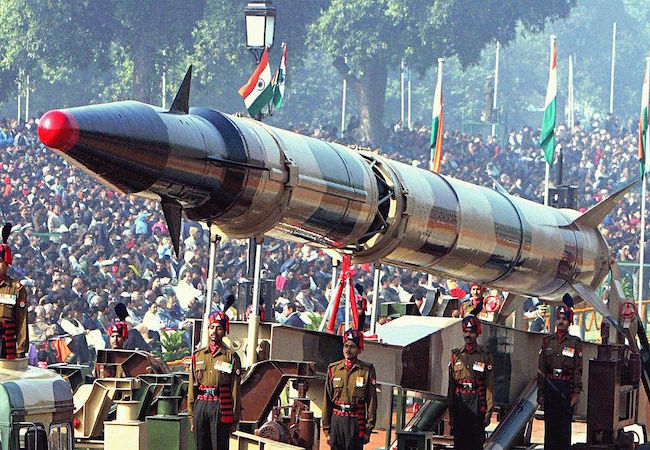
By Muhammad Ali Zoaib
South Asia is a region locked up in several conflicts and disputes that have resulted in many wars between India and Pakistan. The last full scale war between India and Pakistan was fought in 1971. Soon after 1971, India displayed its nuclear capability (in 1974) that forced Pakistan to step up its nuclear program in order to counter the Indian threat. Pakistan worked on its nuclear program very secretly and quickly. In 1983, it conducted its cold tests and latter interviews of A Q Khan and Zia-ul-Haq showed that Pakistan had developed nuclear weapons capability by that time. This was the point where balance of terror vis a vis India was roughly established. In late 1980s, relations between India and Pakistan once again became tense. Indian military exercise, Brasstacks made Pakistan cautious that these exercises were a pretext for full-fledged attack on Pakistan and Pakistan concentrated its forces on Eastern border.
How India was stopped from attacking Pakistan? Jayantanuja Bandyopadhyaya explains in his book, A General Theory of Foreign Policy, that “Pakistan… threatened India with nuclear attack”. He further explains, that Indian high commissioner to Pakistan, S.K Singh conveyed to his government, Pakistani president Gen Zia’s message to India that “Pakistan was capable of inflicting unacceptable damage on it (India)”,which made Indians back track. These proofs clearly indicate that nuclear weapons played a central role in controlling that crisis. Zia regime’s threats were based on nuclear capability which Pakistan had at that time, otherwise the strength of conventional forces alone was not enough to keep India back.
Both India and Pakistan became full-scale nuclear powers in 1998 (though India displayed its nuclear capability in 1974 but India never accepted that its nuclear capability is for military purpose). In 1999, Kargil conflict took place but it did not escalate, here again the role of nuclear weapons was dominant in keeping this conflict limited. Several reports show that exchange of threats of using nuclear weapons took place between India and Pakistan over dozens of times.
In December 2001, the incident of attack on Indian Parliament happened — India accused Pakistan being responsible for the attack and subsequently brought its forces once again on Pakistani border. Which Pakistan reciprocated in kind and was ready to handle Indian attack through all available means. Despite international pressure, Pakistani president, Pervez Musharraf refused to consider the option of, “no use of nuclear weapons”. Here, once again the role of nuclear weapons in controlling this crisis was very prominent.
The Mumbai attacks in November 2008 once again brought both countries to the verge of war. This time India was very aggressive and some clues indicate that India was ready to attack Pakistan. This time diplomacy was used and international community helped to diffuse the crisis. It is widely, perhaps accurately, believed that fear of nuclear annihilation played a key role convincing the belligerent states not to go for a war.
Clearly, the strategic culture of subcontinent changed after overt nuclear capability achieved by both the countries. All full scale wars have been fought between India and Pakistan before nuclearization. The conflicts between India and Pakistan not only remained unchanged but some new dimensions have been added (as Siachen glacier conflict started in 1980s). A limited war has been fought between India and Pakistan (in 1999) but this war did not escalate. The nuclear weapons have established deterrence between both countries and kept both countries away from full fledge war. They have also created balance of powers more efficiently. One thing is clear that there is no conventional balance between India and Pakistan. India is very powerful as far as conventional forces are concerned. Indian military strength is twice than Pakistan. As far as navy and air forces are concerned, here again, India is powerful. Indian defense budget is about five times more than that of Pakistan’s defense budget.
One important thing is that there are independence moments in both India and Pakistan. India accused Pakistan for supporting Mujahidin in Kashmir and Pakistan is accusing that India is supporting insurgents in Baluchistan. It may be right but the core problem is because of policies of both India and Pakistan toward these areas are not liked by locals in these regions and they are struggling for their rights and both countries may support their insurgent groups in each other’s country.
Nuclear deterrence has made both countries to act rationally but conflicts are still there and it clearly indicates that in future many such events can take place that may create war like situation. One positive impact of nuclear weapons on the politics of South Asia is that both of these countries began to use diplomacy as major tool to solve their local problems. No doubt some limited conflicts such as border firing takes place time and again but these conflicts are kept limited and are solved by negotiation. Indeed, the resolution of all South Asian problems is in dialogue and on reciprocal exchange, otherwise any war if starts can play havoc with the fate of South Asia.




